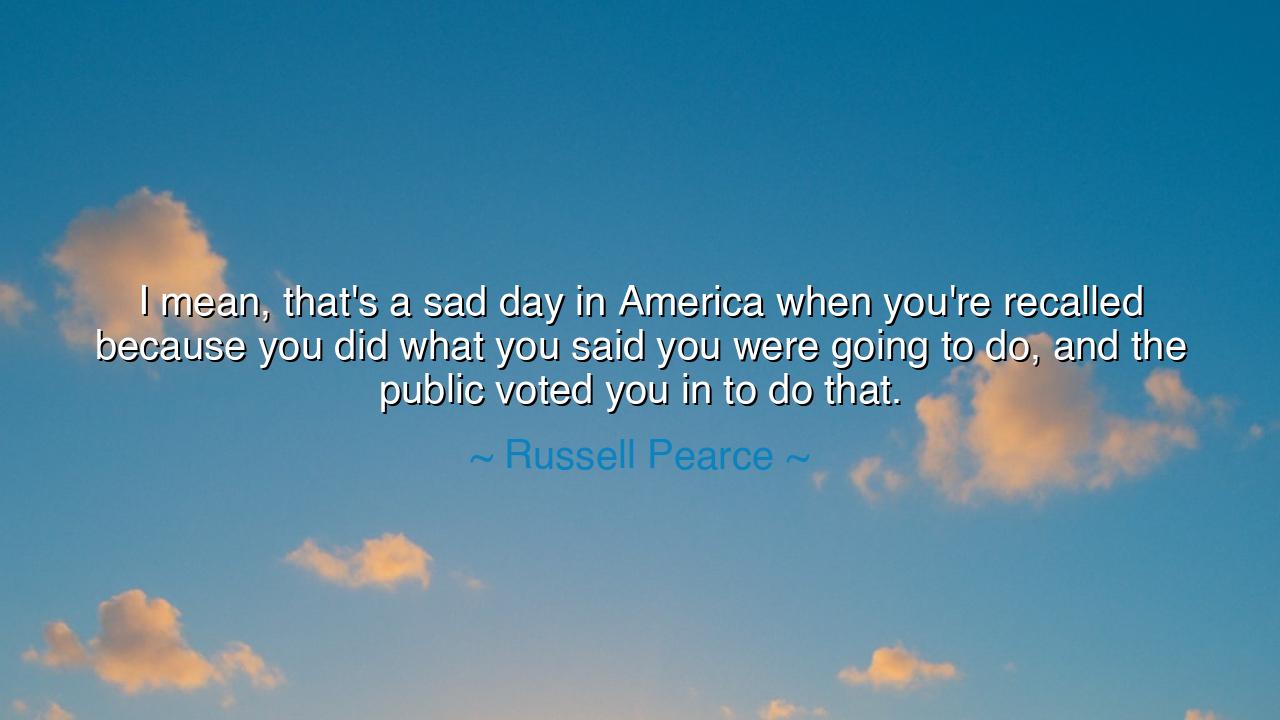
I mean, that's a sad day in America when you're recalled because
I mean, that's a sad day in America when you're recalled because you did what you said you were going to do, and the public voted you in to do that.






Russell Pearce once spoke with the wounded conviction of a man who had stood by his principles and paid the price: “I mean, that’s a sad day in America when you’re recalled because you did what you said you were going to do, and the public voted you in to do that.” These words were not born from comfort but from conflict. They came after his recall from office in 2011, when he, the architect of one of the most controversial immigration laws in American history—Arizona’s SB 1070—was removed from the seat he had won through the will of the people. Whatever one’s stance on his policies, the heart of his statement resounds with a timeless truth: that a society falters when integrity is punished more harshly than deception, and when the courage to act according to conviction is met not with respect, but with rejection.
In the ancient world, the wisest leaders were those who acted according to principle, not popularity. The philosopher Socrates, who refused to betray his conscience even under threat of death, stood before Athens and declared that it was better to suffer wrong than to commit it. Yet Athens, unable to bear the discomfort of his honesty, condemned him. Pearce’s lament echoes the same paradox: that democracy, which thrives upon the voice of the people, can also turn against its own champions when courage becomes inconvenient. To be recalled for keeping one’s word, as he phrases it, is not merely a political failure—it is a moral wound to the very fabric of trust between the leader and the led.
When Pearce says, “That’s a sad day in America,” he is mourning not only his personal defeat but a cultural shift—the weakening of conviction in public life. For in his eyes, politics had become a theatre of appeasement rather than a forum of courage. He points to a deeper illness that all free societies must guard against: the tendency to reward those who flatter and punish those who stand firm. A nation that forgets how to respect steadfastness, even when it disagrees with it, risks breeding a generation of leaders without backbone—faces that change with the wind, hearts that belong to the crowd rather than to truth.
Yet Pearce’s statement also reveals a deeper irony of democracy. The public that elects can also recall, and therein lies both the power and the peril of self-government. In ancient Rome, too, there were times when the people turned upon their champions. Cato the Younger, a man of unwavering virtue, resisted corruption and luxury with every breath. But his incorruptibility made him an enemy of those who sought easy compromise. He died by his own hand rather than see the Republic surrender its soul to Caesar’s ambition. Like Cato, Pearce felt that doing what one promised—living by conviction—had become a liability in a world grown weary of truth.
And yet, there is a noble sadness in his words. He does not rage; he laments. He reminds us that leadership, true leadership, often requires the courage to be misunderstood. Integrity, in its purest form, does not seek approval—it seeks alignment with principle. Those who live by their word, whether celebrated or condemned, serve a higher order than politics: they serve the ideal of consistency between promise and deed. In this, Pearce joins the lineage of those who learned that the path of conviction is often lonely, but never hollow.
From his story we may draw a greater lesson, one that transcends politics: the measure of a society lies not in how it treats those who please it, but in how it treats those who act with integrity even in disagreement. Every generation must decide whether it values sincerity over convenience, truth over comfort. The “sad day” Pearce speaks of is not inevitable—it is a warning. It is the moment when the people, swayed by noise and passion, forget that integrity, even when uncomfortable, is the foundation of trust.
So, my listeners, take heed: do not demand from your leaders perfection, but do demand honesty. Judge them not by whether they mirror your opinions, but by whether they keep their word and bear their duty with courage. And if you lead, remember this ancient counsel—better to fall for truth than to rise through deceit. For the day a people punishes integrity is the day it begins to lose its own. And the only way to restore it is for each soul, great or small, to stand by what they know is right, even when the crowd turns away.






AAdministratorAdministrator
Welcome, honored guests. Please leave a comment, we will respond soon